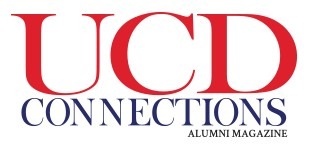EVENTS EARLIER THIS year made the business world sit up and take notice. It wasn’t a good time to float a company on the public markets. Political uncertainty over Brexit, anaemic economic growth in parts of Europe, and nervousness over US-China relations all meant investors were in a sluggish mood.
So when Trainline, a transport technology company led by UCD graduate Clare Gilmartin, made the bullish call to price itself towards the upper end of its valuation when it floated, eyebrows were raised. When the stock took off like a rocket rising to £4.11 from £3.50 on the first day of trading, it became clear that something special was going on at Trainline. The rapidly growing company and its CEO, are now centre stage.
Gilmartin told UCD Connections that she has always been drawn to the working world, even while still a student in Belfield. “I always wanted to be out there, earning and doing something,” she says.
As chief executive of one of the UK’s fastest growing and most innovative transport technology companies, employing more than 600, over half of whom are travel tech specialists and engineers, Gilmartin has come a long way, in every sense. But the instincts that drove her when she was a UCD student, and the skills she acquired then, are still core to her professional life.
Gilmartin always wanted to understand more about business – why it thrived, and why it failed. “I’ve always had a deep-rooted interest in technology-driven businesses, in how they progress, and where they struggle, why they struggle. And where they do well, why they’ve done well.”
Gilmartin describes herself as the ultimate generalist, which drew her to a BComm degree, which she says “really opened my eyes and was probably quite influential in what I went on to do”.
“Twenty-two years later, I realise that as a CEO, I am a true generalist, and I quite like that – working with diverse teams and individuals across the business to drive growth.”
LEADERSHIP STYLE
Gilmartin describes herself as “a very customer-centric leader”. Throughout her career, she has sought out and put great value on different perspectives, moulding an approach to problem solving that involves viewing an issue from as many different angles as possible.
After graduation, she got a job with Unilever, and was placed on secondment to Asda Walmart as part of the conglomerate’s graduate programme. The company wanted its junior executives to experience a frontline position, not to be remote and detached from its customers’ perspective. Understanding what the consumer wanted, and how to react to that, was key. “I loved it. It gave me the customer view of the world, which was hugely helpful in going back into Unilever,” Gilmartin says.
Trainline allows its users to plan and purchase tickets for train and long distance coach journeys across the UK and Europe. While the front end process is seamless for users, the company is like the proverbial swan – serene on top, but beneath the surface, there is enormous and complex industry. Trainline works as a marketplace, connecting consumers with travel companies. Gilmartin’s job is to ensure that marketplace works well, which involves deep analysis of customer behaviour, world class online infrastructure, and an ability to manage relationships with both consumers and providers. It’s the perfect job for a generalist who puts huge stock in understanding the customer perspective.
After leaving Unilever, Gilmartin joined Ebay in 2003, when e-commerce was in its infancy. Again, she put a ground-up understanding of her customers’ point of view at the centre of what she did. Her first role was as head of Ebay motors – she immediately called and visited 40 different motor dealerships. There is a core principle underpinning her approach – that in a rapidly changing commercial world, first principles of business matter: know – and understand – your customer. “Particularly in technology and online, where there is so much change, literally every day, I have found that throughout the last 15 years, maintaining as a constant that ear to customers can be very grounding and has been a tremendous guide to my team in the decisions we have made all along the way.”
Today, Gilmartin travels widely, meeting train and coach carriers across Europe and the world. She also sits in on consumer research groups. “I believe you have to hear it direct,” she says.
If customer-centrality is one key aspect of her leadership style; another is what she calls “an innate restlessness”. “I’m always trying to improve the status quo, and I love innovation. I love finding solutions tomorrow for things that were hassle today. I like where tech can improve everyday life, and I love that it changes every day, and that what we do next year will be better than what we’ve done this year.”
Gilmartin places a great emphasis on exceeding expectations, yet rejects the culture which demands that long hours are spent in the office, to the detriment of everything else. “Things like focusing on hours worked are totally irrelevant,” she says. “I realised after I had kids that if success were to be measured in terms of hours worked or hours at a computer screen, then I wasn’t going to win. But if it were to be measured on impact on customer and impact on business results, then I probably had a chance,” she says. This is part of being a “human and grounded leader”. “I know we have built a very low-ego culture and environment here at Trainline and I think I had the same at Ebay. That’s important – we don’t think there’s any room for ego in business. Being humble and human and listening well is a really important part [of leadership].”
Before she started with Trainline, she spent a couple of days “just travelling around on trains and asking people questions about their travel”.
“I got very funny looks, not least because I was six months’ pregnant at the time,” she recalls. The approach goes to the core of Gilmartin’s leadership style; understanding how complex problems can be solved by seeking a wide variety of viewpoints. What she learned – and continues to learn – about the rail and coach transport sector makes her very excited for the future.
In 2012, she embarked on a family trip through Europe by rail, which she found “unusually difficult,” navigating clunky websites in different languages. Improving this experience is Trainline’s aim.
“When the CEO [of Trainline] opportunity arose, I relished the notion that this is a huge travel vertical globally, and yet it’s still very low online penetration, only 30 to 40 per cent, and that to me seemed a big opportunity,” she says. There are several big and important trends, Gilmartin believes, which will continue to drive the sector’s growth.
But beneath the surface, there is enormous and complex industry. Trainline works as a marketplace …
“As a generation we have all signed up to a massive reduction in transport emissions over the next several decades, and it’s fairly obvious to me that will only be achieved by a shift in travel mode, and in particular greater use of environmentally friendly transport like trains,” she says, pointing out that travelling by train produces around 1/20th of the emissions of air travel, and just one quarter of car travel.
Huge investment by governments in capacity expansion and high speed rail will also drive consumer behaviour, she says, citing the relative collapse of the Milan- Rome air route after high-speed rail was introduced, and how rail took almost 80 per cent of the London-Paris travel route once Eurostar was introduced. Politicians around the world are also committed to reducing congestion and improving urban transport systems. Navigating these new systems requires smart technologies that reduce friction for consumers, she says. Trainline aims to be the connective tissue between society’s new major transport arteries.
Gilmartin is also confident that Trainline can withstand any potential onslaught from the behemoths of the digital world. Google, Facebook, Amazon, and to a lesser extent Uber, are constantly looking for the next online growth segment, voraciously hunting a new corner of the internet where consumers will spend money and time. However, Trainline is no minnow, and won’t be easily consumed. Its sales were over £3bn last year, and Gilmartin says that it has built a system that would be difficult to replicate, even with the resources of a Google or Facebook. What’s more, the relationships and industry knowledge the company has accumulated are the product of years of work.
“We’re growing fast. Given our size, we have a huge amount of rail and coach specific data, which we’re able to leverage uniquely to create bespoke features for our customers, things like price prediction, platform prediction, even available seat prediction. We are uniquely in possession of that very rail and coach specific data which means we can create a user experience that is very hard to replicate,” she says.
“We can create a user experience that is very hard to replicate …”

EDUCATION AND GENDER
London is home, but Gilmartin retains a strong sense of pride in Ireland, including in the Irish education system, which she says is superior to its British counterpart, especially on numeracy. She also sees this as a key part in advancing gender equality in the workplace.
“I love the fact that maths is mandatory in Ireland right up to the point you leave school. In the UK, only eight per cent of girls take maths at A Level. If I think about the digitisation of the world, and the role of numbers in business, I think it’s a crying shame that we have so few female school leavers in the UK who have maths as part of their toolset.”
Making the world of business a more gender representative place, Gilmartin says, is key. “We still live in a world where the majority of leadership positions are held by men, and that’s something I would love to see change. Some of the basics have already been addressed by previous generations around maternity leave and flexible working. The job for our generation is to change attitudes and cultures around the workplace.”
Her emphasis on a corporate culture that emphasises results rather than presenteeism can be attributed in part to a desire to rebalance the gender scales in the business world. Female employees at Trainline now account for 40 per cent of the total. There is a business rationale, as well as a moral imperative, at work. “Diversity creates diversity of thinking which lends itself to better problem solving and better business results and ultimately better products for a diverse global customer base,” she says.
MEMORIES OF BELFIELD
When she was at UCD in the mid 1990s, the technologies that would later surround her and which she would use to forge a hugely successful career were in their infancy. “I loved UCD; it was vibrant and I think it set me up incredibly well for the career I’ve had since.”
These days, a blend of skills – human, business and technological – is core to her and Trainline’s success. Outside of the working world, her life is centred around family. “My ideal day in general is spent with my family. We love being out in the countryside, walking the dog, having picnics or pub lunches; that’s where I’m happiest.”
Written by Jack Horgan-Jones
Photography Jason Alden

